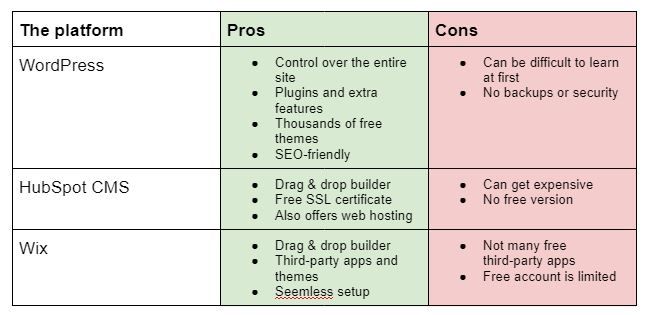Want to be a full-time blogger but having trouble building your readership?
Maybe you haven’t even started but see your potential as a great writer.
The good news is you’ve come to the right place. Your parents likely don’t understand what you do, but society is catching on, so don’t hesitate.
The Huffington Post, a news blog, makes an estimated US$500 million in revenue annually. Glassdoor surveys that the average yearly income of a full-time blogger is over US$60,000, though there’s no cap on what you can earn.
Why wait? Follow our practical guide to becoming a seasoned, full-time blogger.
Where do I start as a full-time blogger?
Choose a blogging platform
There are so many blogging platforms to choose from these days. Every platform is different, so your choice will depend on your needs and skills.
The most popular blogging platforms are WordPress, HubSpot, and Wix.

Take a blogging course
The online learning market has been flourishing in recent years. This makes learning about becoming a full-time blogger easy and cost-effective.
The Skillshare learning platform offers a wide range of practical courses for the blogging-newbies. For instance, you may want to try a Blogging Basics course for free and learn how to design, manage, and market your blog.
How do I boost my blog to the next level?
Now that you’ve taken the leap to become a full-time blogger, it’s time to ensure your success. Follow these 15 tips to grow your blog and beat out competitors.
#1 Pick a reliable web hosting
If your blog is like your house, your web hosting provider is the foundation. The perfect blog means nothing if you have an unreliable web host.
There are countless hosting providers to choose from. Some of the best are:
- Blue Host – best for beginners;
- Hostinger – best budget option;
- GreenGeeks - eco-friendly choice.
Fast website speeds and security are what you should look for in a provider. You could lose dedicated readers if they face server errors while using your site.
#2 Learn Search Engine Optimization (SEO)
Be honest – do you ever scroll past the first page of Google? No one does. For this reason, every full-time blogger needs some SEO knowledge.
SEO is the method bloggers and businesses use to rank higher on search engines. Optimized content has a higher chance of showing up on the first page.
Try installing SEO plugins on your website. Otherwise, enroll in The Ultimate SEO Training Course on the Udemy learning platform to learn more about the fascinating world of SEO.
#3 Treat your blog like a business
Some find it takes years to turn their blogging hobby into a profitable business. Treating your blog like a business from the start might be the step you need to take.
This means implementing changes to how you run your blog:
- Producing high-quality content;
- Having a consistent voice and brand message;
- Frequently interacting with followers;
- Developing a professional design and branding for your blog.
Keep your eyes open to investment and expansion opportunities. You’re no longer just a blogger; you’re a small business owner.
#4 Take care of cybersecurity
Blogging is so much work, but your blog becomes your treasure after a while. The last thing you want is a hacker ruining all your hard work.
Safe web browsing practices are crucial for an aspiring blogger. Use a VPN to hide your specific location while browsing the internet.

Make sure to regularly back up your site and learn about email phishing scams to avoid them. Subsequently, for all that is good in the world – use a unique password!
#5 Know your competition
What kind of content do they create? What do they do well - where do they lack? Knowing your competition is essential for a full-time blogger.
Use tools such as Semrush or Ahrefs to view numerous data about your competitors. These include web traffic and even the keywords they target in their article.
You can learn so much by observing the biggest blogs in your niche. Writing unique content that your competitors haven’t covered increases your reputation.
#6 Strive to consistently create content
Whatever you do, don’t stop writing. It can be as little as a post a week, but your blog should always be a haven of new content.
Once you’re posting regularly, start creating additional forms of content for your visitors. The possibilities are endless:
- eBooks;
- Informational newsletter campaigns;
- Courses;
- Promoting physical products;
- Podcasts and other media.
Fresh content will draw in new readers and consolidate your current audience. Promoting extra content is also a great way to convert readers into subscribers.
#7 Develop your unique voice
While it’s trendy to publish “Top 10” and clickbait articles, it won’t help you to stand out. Only you can sound like you so capitalize on your individuality.
Write content that appeals to you in your own voice. You might find readers will come back to your blog simply for your writing style.
Develop valuable content to build trust among your audience. Deliver it in a unique voice and you’ll hook your readers.
#8 Promote your blog
In a perfect world, a great blog would attract readers just by existing on the web. However, if you want your blog to be seen, you must promote it.
Promote your site in several ways:
- Social media marketing;
- Guest posting;
- Email marketing;
- Advertising via Google, Facebook, etc.
Give possible subscribers the opportunity to read your content. Through promotion, your blog traffic can increase exponentially.
#9 Learn to read Google Search Console
If you haven’t signed up for Google Search Console, it’s time. Through this tool, you can see an expansive overview of your website.
You’ll see metrics like total website clicks, the average time someone spends on your page, most visited pages, and much more.

Track your blog’s progress and learn to read the data. Any full-time blogger should be able to comprehend most of the vital metrics.
#10 Use email marketing campaigns
Did you know a blog’s best asset is its subscriber list? This is your dedicated base of readers and commonly your biggest source of income.
Successful full-time bloggers know the art of the newsletter. A well-curated email marketing campaign strengthens readership and produces sales.
Affiliate marketing over newsletter campaigns is essential for a modern blog. Give it a go yourself, or hire a copywriter to create one for you.
#11 Monetize your blog
Every healthy blog business needs income. Deciding on what way you’ll monetize your blog is an important decision. Here are some of the options:
- Ads: Fixed ads on the site via companies like Google AdSense, Monumetric, AdThrive, etc.
- Affiliate marketing: Receiving a commission per purchase made through a link from your site
- Sponsored content: Companies pay you to write about their products or services
- Brand ambassador: Get paid to be the face of a company or their product
Ads can increase your authority as a business or turn people off your site completely. Choose your forms of monetization wisely, as you don’t want to alienate your subscribers.
#12 Practice content recycling
You spent hours editing those photos and making your post perfect. It would be a shame to use all that content only once.
Turn your blog post into an infographic for sharing or another post. Repurpose your photos, graphics, and writing for social media posts.
You can update old articles for easy blog posts. Content doesn’t grow on trees so reuse what you already have as much as appropriate.
#13 Expand your blogging networking
Connecting with other bloggers can build long-lasting industry relationships. In the flooded blogging market, friends can keep you afloat.
Reach out to like-minded bloggers to set up guest posting, cross-promotion, and social media collaborations.
Cooperations like this benefit both parties. Long-term friendships can even become strong business contacts in the future.
#14 Always learn something new
Never stop learning! What you know may get you far, what you don’t may get you further. The booming online course market is your best option.
Search through sites like Udemy and Skillshare. Online courses are an investment that can return more than just money.
“You are always a student, never a master.”
- Conrad Hall
To give you some inspo, The Ultimate Guide to Strategic Marketing and WordPress Academy are two worthwhile courses for full-time bloggers.
#15 Have patience
A skill we all wish we could master – patience is the virtue of the full-time blogger. It takes time, commitment, and a truckload of persistence.
Technorati found that 95% of blogs on the internet are now derelict and unused. This suggests that the vast majority of bloggers give up.
Full-time bloggers get to where they are through patience. Your viewership will rise sometimes and drop other times. Just keep writing and don’t give up.
Conclusion
In an age where reading a blog is as normal as a book, full-time blogging is an advantageous job.
While it takes dedication and hard work to pull off, you too can make a living as a full-time blogger.
Now it’s time to level up your blogging skills and share your voice with the world.

